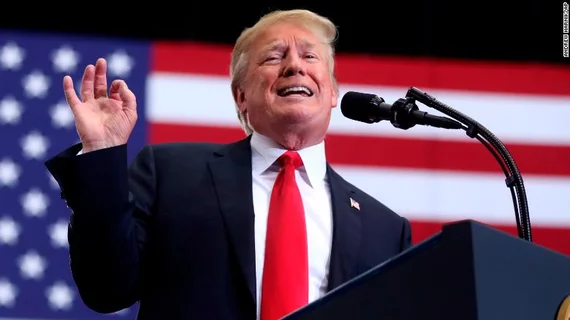Can Trump really lower drug prices?
From taking swipes at specific drug companies on Twitter to promising to bring drug prices down “really, really substantially,” President Donald Trump has said a lot of things about the issue of skyrocketing drug prices. However, many Americans aren’t buying that he can actually lower prices, according to a recent study.
Still, the administration is promising to make “some fairly large, disruptive changing of the rules of the road,” HHS Secretary Alex Azar said in an interview with Bloomberg on Sept. 12.
The Trump administration has already taken several steps that could lower drug prices, including allowing Medicare Advantage plans to negotiate step therapy drugs, introducing easier standards for biosimilars to compete in the market and opening the door to import drugs from Canada and other countries. Several of these measures were loosely outlined in the administration’s blueprint to lower prices, released in May.
American sentiments
Those actions may be tough for Americans to believe in as consumers face rising prices and headlines implicate greedy corporate practices, such as price gouging. Just this week, a pharma executive defended his decision to increase the price of an antibiotic mixture 400 percent—to more than $2,000 per bottle—by declaring he had a “moral requirement to sell the product at the highest price,” Financial Times reported.
Despite the rhetoric from the Trump administration, most Americans feel drug prices are unreasonable and aren’t convinced the President and Congress are doing much to handle the issue, according to a study from nonprofit research groups the West Health Institute and NORC at the University of Chicago.
About 10 percent of the $3.3 trillion spent on healthcare in the U.S. is for prescription drugs, and the rising costs have been largely driven by expensive new specialty medication and high prices for existing, patented drugs. A recent analysis from The Wall Street Journal revealed price increases of prescription drugs are a leading driver of skyrocketing healthcare costs overall, which already far exceed other nations.
Two-thirds of Americans are very concerned about the high cost of prescription drugs, and 88 percent say the costs should be a priority for Congressional candidates this year.
Consumers are also hungry for reform. More than 80 percent of Americans support allowing Medicare to negotiate drug prices directly with pharmaceutical companies—a campaign proposal made by Trump that never made it into the administration’s blueprint to lower drug prices. The public also has high support for other efforts, including increasing competition for generics, importing drugs and requiring companies to be transparent about their pricing.
The blame game
As worries rise, the blame for higher drug prices and overall costs continues to bounce between industry stakeholders. Dozens of drug companies are facing civil enforcement actions for price fixing of several drugs by the attorneys general of 47 states, Washington, D.C., and Puerto Rico as well as lawsuits from health insurance giant Humana.
Policymakers want to look at how mega-mergers across the space, including CVS Health’s $69 billion acquisition of Aetna, will impact drug prices and healthcare costs.
Pharmaceutical trade association PhRMA, which disagrees with parts of Trump's blueprint, recently released a study stating that hospitals inflate prices of medications as much 500 percent on average. The association has also placed blame on pharmacy benefit managers in the last year.
PBMs, often referred to as the middlemen in the industry, have continually come under fire for their role in higher prices and had to defend their position and role in the healthcare space.
Azar, himself a former executive at pharma company Eli Lilly, also recently came to the defense of PBMs.
“I am not blaming pharmacy benefit managers for the position we are in around drug pricing or the dynamic of rebates,” Azar told Bloomberg during the interview. “The pharmacy benefit managers do an incredible job negotiating discounts, rebates in our system. In fact, a major part of the president’s plan is that we’re further empowering pharmacy benefit managers.”
President Trump has taken a harsher line with PBMs, previously stating his future policies would eliminate the middlemen.
Despite Azar’s defense, HHS could be proposing a major shift in the rebate system, where PBMs collect rebates from drugmakers for status on drug plans. The agency submitted a proposal—unavailable to the public—to the White House in July that offers a clue into HHS’s direction only through its title: “Removal Of Safe Harbor Protection for Rebates to Plans or PBMs Involving Prescription Pharmaceuticals and Creation of New Safe Harbor Protection,” Bloomberg reported.
Potential changes in the proposal could take aim at boosting transparency by eliminating the rebate system entirely, though Azar was mum on specifics with Bloomberg.
While consumers wait for significant changes in drug prices, other initiatives are moving forward, such as a recent partnership between three health foundations and seven hospital systems to form their own not-for-profit drug company to develop generic drugs. The entity, Civica Rx, has $100 million in funding.

